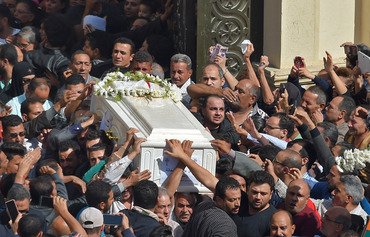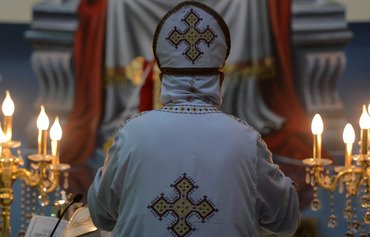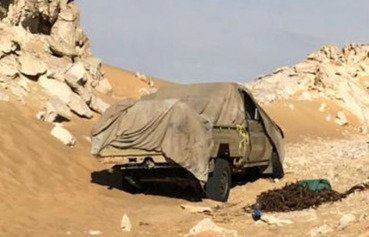As the "Islamic State of Iraq and Syria" (ISIS) comes under heavy fire from a military offensive in Egypt's Sinai peninsula, the group is trying to launch attacks in other parts of the country to recoup some of its losses, experts say.
Egypt's army has since February waged a major operation dubbed "Sinai 2018" aimed at neutralising extremists in the desert region.
But after several months of calm, ISIS on Friday (November 2nd) claimed an attack in central Egypt that killed six Coptic Christian pilgrims and one Anglican worshipper.
Gunmen opened fire on the devotees as they headed home on a bus from the St. Samuel monastery in Minya province south of the Egyptian capital.
"At a time when ISIS is weakened in Sinai, it is trying to launch operations elsewhere in Egypt," said Mustapha Kamel al-Sayyid, political science professor at Cairo University.
Minya province provides "fertile ground" for terror operations, he said.
"The Islamists are rooted in central and upper Egypt, particularly in Minya and Assiut -- it is not difficult for ISIS to recruit in this region," said al-Sayyid.
Copts, a Christian minority that make up 10% of Egypt's 97 million people, have been repeatedly targeted by ISIS in recent years.
The latest attack was preceded by a nearby assault in May 2017 also claimed by ISIS, when masked gunmen ordered Christians travelling to St. Samuel to get off buses and recant their faith.
The pilgrims refused and were shot one by one, leaving 28 people dead.
Since December 2016, terror attacks in Egypt have left more than 100 Christians dead.
The extremists' goal is to show that "Egypt is not stable", al-Sayyid said, even as the Sinai operation has already netted more than 450 extremists between February and October, according to the army.
'Massive problem'
H.A. Hellyer, senior non-resident fellow at the Atlantic Council and the Royal United Services institute in London, said the latest assault "shows that the wider issue of sectarianism being instrumentalised to support certain parts of radical extremist opposition continues to be a massive problem".
The Egyptian Ansar Beit al-Maqdis group pledged allegiance to ISIS in 2014, gaining expertise and logistical support from the terror group.
The extremists soon ramped up their attacks on civilians, planting a bomb on a Russian airliner carrying holidaymakers from a south Sinai resort in 2015, killing all 224 people on board.
Friday's attack in Minya province showed that ISIS can still hit hard outside the peninsula, despite retaining only a few hundred or so increasingly squeezed fighters in Egypt, according to experts.
Alongside attacks against Copts, the extremists have killed hundreds of soldiers and policemen in Egypt in recent years and were allegedly behind a November 2017 attack against a mosque in north Sinai that killed more than 300 people.
After that attack, al-Sisi gave his security forces three months to re-establish order in Sinai.
Egyptian authorities have also convicted extremists for their role in attacks against Copts.
Last month an Egyptian military court sentenced 17 people to death over the suicide attacks against churches in 2016 and 2017.
Egypt also has held several joint military exercises this year to boost counter-terror capabilities and readiness, including "Bright Star 2018", held in September with the US and other partners.
The Bright Star exercises focused on security co-operation, counter-terrorism and training on different threat scenarios, using both conventional and asymmetric warfare.

![Crowds gather on November 3rd as Coptic Christians carry the coffins of victims killed in an attack a day earlier, following a morning ceremony at the Prince Tadros church in Egypt's southern Minya province. [Mohammed al-Shahed/AFP]](/cnmi_am/images/2018/11/06/15250-egypt-copts-attack-600_384.jpg)







By the way, killing Christians in Egypt was taking place before ISIS elements appeared and al-Kushh is the best proof of that. When a problem takes place between any Christian and a Muslim, it will always expand and flare up, although Muslims kill each other more than they kill Christians. This means that injustice is there for all, or rather, for the weak. The solution lies in enforcing the law on all, whether rich or poor, strong or poor, powerful or vulnerable; all are equal. This solution can be implemented by the police alone, and in this case, everyone will be relieved.
Reply2 Comment(s)
Let the army come and cleanse al-Menya and make its population like the people of Sinai so we can be relieved. By the way, I live in al-Menya, and more precisely Samalut. We and Christians are one family.
Reply2 Comment(s)